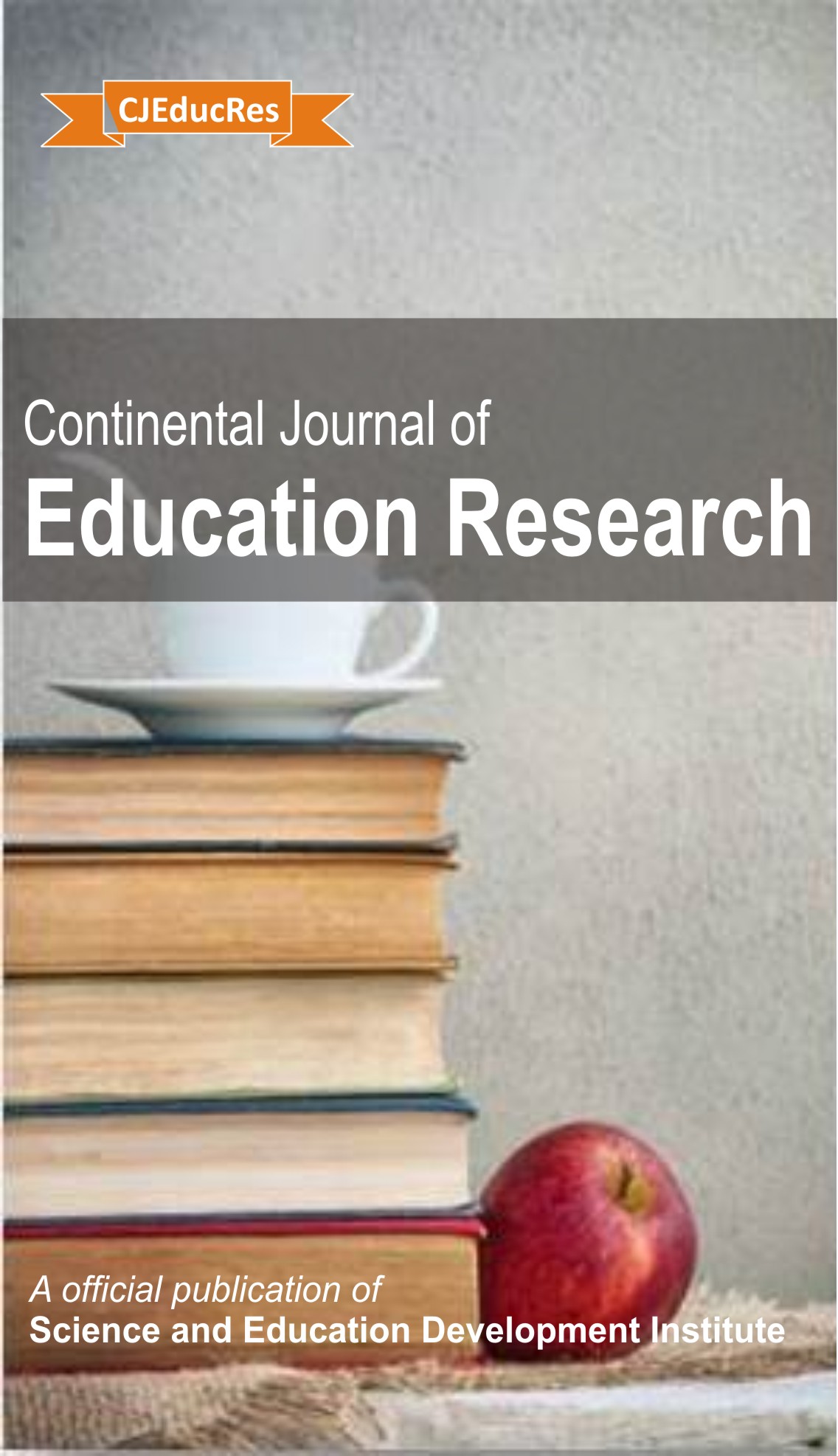
CONTINENTAL JOURNAL OF EDUCATION RESEARCH
Science and Education Development Institute
DOI: 10.5897/UJ-CJEducRes
Email: managingeditor.olawale71@gmail.com
GENDER FACTOR ON THE EFFECTS OF GUIDED INQUIRY TEACHING METHOD ON STUDENTS ACHIEVEMENTS IN LOGIC
DOI: 10.5897/UJ-CJEducRes.17.006.1 | Article Number: BF08A74 | Vol.9 (1) - June 2016
Authors: Bakke Manasseh Matthew and Itankan Areachot Wilfred
Keywords: Logic, guided inquiry, covariates, gender factor, interaction
This study was designed to investigate the gender factor on the effects of guided inquiry teaching method on student’s achievement in logic. One research question was posed and answered; and two hypotheses were formulated and tested at (p ≤ 0.05) level of significance. Logic Achievement Test (LAT) was used as an instrument for the data collection, it consist of 25-items (20 objectives and 5 essay) covering the algebra of logic in the four types of logic statement administered on a sample size of 197 students before and after teaching. These students were randomly drawn from senior secondary schools in Jalingo Educational Zone of Taraba State, Nigeria. The study which lasted for two months generated data that was analyzed using mean, standard deviation and analysis of covariance (ANCOVA) with pre-test scores as covariates. The study revealed that there is no significant difference between the mean achievement scores of male and female students who were taught logic using the guided inquiry teaching approach as measured by mean logic achievement test. Lastly, there is no significant interaction between the guided inquiry teaching approach and gender on students’ achievement in logic. Based on the findings, recommendations were made.
Adebayo,A. O.(2001) The place of mathematics in Nigeria secondary schools. Monograph on Effective Teaching of Mathematics. Lagos; 2, 1 – 7.
Aichele, D. B. and Reys, R. E. (Eds ) ( 1974 ).Readings in Secondary School Mathematics. Boston: Prindle Weber and Schmidt.
Alio, R. C. and Harbor-Peters, V. F. (2000). Effect of polyaʹs problem solving Technique on secondary school students’ achievement in mathematics. Abacus: The Journal of Mathematical Association of Nigeria; 25 (1) 20 – 25.
Bakke, M.M and Igaro O.K. (2013). A study on the effects of Guided Inquiry Teaching method on students’ Achievement in Logic. International Researchers. 2(1), 135-140.
Bosede, A. O. (1992). Towards a positive approach to the teaching of Logic at the Senior secondary schools in the 1990s. Abacus: Journal of Mathematical Association of Nigeria. 22(1) 56 – 66.
Corno, L. and Edelstein, M. (1985). Information processing models of teaching.
Dagoli, A. T. (1999). Effects of Guided Inquiry Teaching Method on Students Achievement in Geometry. Unpublished M. Ed. Thesis. Faculty of Education. University of Nigeria, Nsukka.
Egbeke, A. (1992). Logic and clear thought: An Invitation to Good Reasoning Enugu: Oak Publishers Limited.
Ezeugo, N.C and Agwagah, U.N.V (2000). Effects of Concept Mapping on Students’ Achievement in Algebra: implication for Secondary Schools Mathematics education in the 21st century. Abacus: Journal of Mathematical Association of Nigeria. 25(1)1-12.
Harbor Peters, V.F.A (1992). Model Mathematics projects and its implementations to Mathematics instruction. Abacus: Journal of Mathematical association of Nigeria. 22 (1), 79-90.
Hussen and T. N. Postlethwaite (Eds). The International Encyclopedia of Education. Oxford: Pergamon Press PLC.
Isodere, C.N. (1997). Introduction Philosophy and Logic Aba: A.A.U. Industries, Publishing division.
Jahun, I. U. and Momoh, J. S. (2001).Environmental and sex on mathematics achievement. Abacus: Journal of Mathematical Association of Nigeria. 26 (1) 53- 58.
Joanne, V. (1998). Teacher education: The teachers’ role in inquiry-centred experiences. Science Teachers Association of Nigeria. Bulletin 15(2), 8 – 10.
Kurume, C.N. (1999). The Effects of Teaching Algebra with Inquiry Method on Students Achievement. Unpublished M. Ed, Thesis. Faculty of Education. University of Nigeria, Nsukka
Massialas, B. G. (1991). Discovery and Inquiry methods. In A. Lewy (Ed). The international encyclopedia of curriculum. Oxford: Pergamon Press PLC.
NERDC (1997), August 11). The Performance of students in the Physical Sciences over the years. Guidance newspaper limited. PP3.
Obioma, G. O. (1992). Teachers’ assessment of the difficulty levels of the Further Mathematics content. Abacus: Journal of Mathematical Association of Nigeria. 22 (1), 48 - 51.
Obodo, G.C, (1990). The differential Effects of three Teaching Method on Performance of Junior Secondary School Students on some Algebraic Concept. Unpublished Doctoral Dissertation. Faculty of Education. University of Nigeria, Nsukka.
Odogwu, H. N. (1995). The effects of laboratory approach on the performance and retention of different ability group in “2” and “3” dimensional geometry. Journal of Studies in Curriculum. 5, 6 (1, 2), 9 – 15.
Okoro, O. M. (1993). Principles and Methods in Vocational and Technical Education. Nsukka: University Trust Publishers.
Olagunju, S.O. (2001). Sex, Age and Performance in Mathematics. Abacus: Journal of Mathematical Association of Nigeria.26 (1), 8-16.
Olarinoye, R. D. (1982). The inquiry and discovery methods of teaching sciences. Journal of Science Teachers Association of Nigeria. 21 (1), 168 – 180.
Timothy J. and Awodi, S. (1997). The relative effects of inquiry and lecture methods on the performance of high and low achievements in senior secondary school biology. Journal of Science Teachers Association of Nigeria. 32 (1, 2) 59-64.
Ugwu, P.N. (1998). Women in Mathematics, Science and Technology: Challenges for Nigerian Women. Journal for Women in Colleges of Education, 2, 8-10.
Usman, K.O. (2002). The need to Re-train in Service Mathematics Teachers for the attainment of the objectives of Universal Basic Education. The Journal of Mathematical Association of Nigeria (MAN) 27 (1) 19-29.
